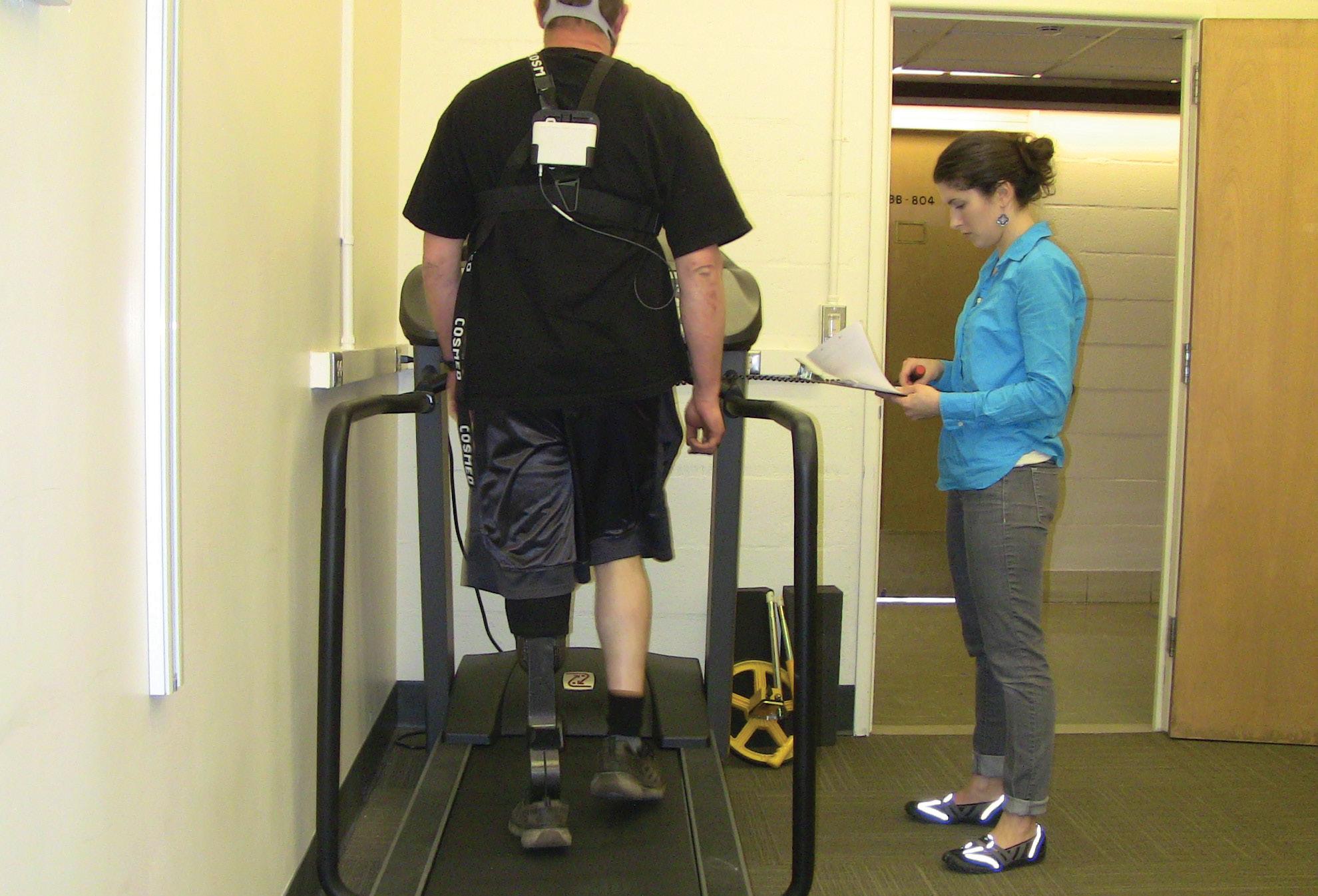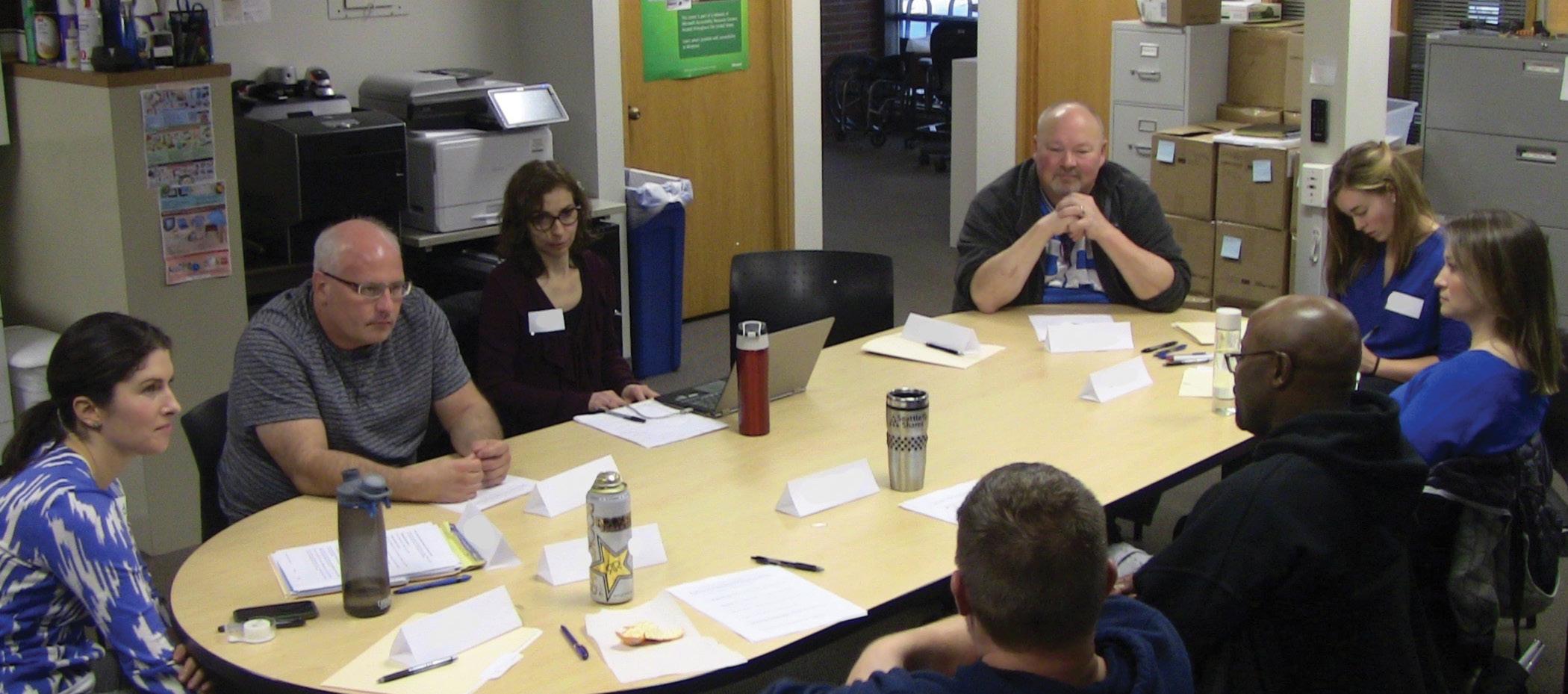
7 minute read
PRINCIPAL INVESTIGATOR
from May 2021 O&P Almanac
by AOPA
Giving Voice to the Underrepresented
UW researcher focuses studies on improving care for marginalized populations
O&P Almanac introduces individuals who have undertaken O&P-focused research projects. Here, you will get to know colleagues and healthcare professionals who have carried out studies and gathered quantitative and/ or qualitative data related to orthotics and prosthetics, and find out what it takes to become an O&P researcher.

FOR CODY L. MCDONALD, PhD, MPH, CPO, patient interactions during the early days of her career spurred her decision to pursue O&P research goals. “First as a clinician and then as an orthotist mentor working in Laos, I attempted to collect data to assess my patients’ outcomes and inform treatment plans,” recalls McDonald. “Unfortunately, I did not have the training in outcome measurement that our master of prosthetics and orthotics (MPO) students now receive, so I struggled to meaningfully implement evidence-based practice on my own.”
McDonald, who earned a bachelor’s degree in prosthetics and orthotics from the University of Washington (UW) in 2006, spent her early career as a clinician in the Department of Orthopedic Surgery at the University of California, San Francisco. In 2012, she pivoted to spend a year in Vientiane, Laos, as part of the Cooperative Orthotic and Prosthetic Enterprise (COPE), which works in collaboration with the Laos Ministry of Health Rehabilitation Centers to provide prostheses, orthoses, and therapy.
“My position was funded under a USAID grant,” she explains. McDonald worked with a team of mentors, including a physical therapist (PT), occupational therapist, and pediatric PT, who provided training for local orthotists, prosthetists, and therapists. She helped develop care pathways for patients and engaged in outreach to increase awareness about COPE and available rehabilitation services. The year spent overseas served as a “huge learning experience” for McDonald. “My time working in Laos solidified my interest in O&P education and global
Cody L. McDonald, PhD, MPH, CPO, works with a patient.

McDonald, far left, participates in a focus group.
O&P development. That experience motivated me to return to school for a doctorate to obtain the skills necessary to conduct clinical research and teach.” She subsequently earned a master’s degree in public health in 2017, and a doctoral degree in rehabilitation science in 2019—both from UW.
Global Goals
McDonald, who today serves as acting assistant professor in UW’s Department of Rehabilitation Medicine, is most interested in research that helps improve care for marginalized populations, both in the United States and abroad. “This can come in many shapes and forms,” she says. “Qualitative methods are an important tool for me to truly conduct patientcentered research. I don’t focus on specific etiologies or devices, but rather seek to give a voice to O&P patients who are underrepresented in research and education.”
McDonald recently conducted a pilot study to examine how social network analysis methodology can be applied to explore information sharing among faculty in O&P. The research team examined networks of faculty members at a program in the United States and one in Ghana. “We found that the networks of information sharing were very different, and that social network analysis can provide useful insights into O&P education programs,” she says. For example, in Ghana, the faculty share information frequently with all colleagues, likely due to the singular focus of the program on training O&P students and the lack of other information sources, such as textbooks, other O&P colleagues, manufacturers, and peer-reviewed journals. “In the United States, faculty were much more siloed and were less connected,” she explains. “This is likely due to academic culture and the location of this O&P program within a much larger institution.”
She also conducted a systematic review of O&P education research, concluding that education research in O&P is very limited but has been increasing in recent years. The review included studies spanning geographic locations, topics, and methodologies. “Quality of the research varied substantially, and collaborations … should be encouraged to improve the quality of research being conducted in O&P education,” she says. Studies examined teaching/learning methods, aspects of content/curriculum, and program-level topics. “Overall, O&P education research lags behind clinical research and impedes the ability of educators to employ evidence-based education. We need a culture shift in O&P education to support and encourage research and peer-reviewed publication to better inform education for future clinicians.”
In another recent investigation, McDonald studied the global prevalence of traumatic limb amputation. In addition to identifying the geographical areas with highest prevalence of traumatic amputations—East Asia, South Asia, and Western Europe—McDonald determined the leading causes of trauma-related amputation: falls, road injuries, and other transportation injuries. She also identified a need for 75,850 prosthetists to treat the 57.7 million people who have traumatic amputations across the globe.
Currently, McDonald is studying “how we prioritize outcomes for lower-limb prosthesis users, and how stakeholders—including payors—define successful outcomes,” she says. “I hope this work will provide insight into how stakeholders differ in their definitions of success and potentially identify areas where we can better align our expectations and goals. Payors are an important group for this conversation, and I’m optimistic that this research will shed light on discord among stakeholders within lower-limb prosthetics.”
Influencing O&P Students
In addition to her research endeavors, McDonald spends much of her time inspiring O&P students to consider research work. She teaches the evidence-based practice course series for UW’s MPO program, which features an introduction to research, critical appraisal of the literature, and two evidence-based practice courses. She also mentors MPO students through their capstone projects in the second year of the program. “I love all the ways that my students challenge me. My students inspire me to think in new ways and question my own assumptions and beliefs,” she says. “I also love to see students grow and change throughout the program and into their careers. I constantly find pride and joy in my students’ successes.”
McDonald also teaches introduction to global rehabilitation in the rehabilitation science doctoral program at UW. “This course brings together experts in global health and global rehabilitation to provide an overview of the design and implementation of global rehabilitation projects and programs,” she says.
As an executive board member of the U.S. Member Society of the International Society for Prosthetics and Orthotics (USISPO), McDonald is working with Alex Hetherington, CP, to convene a USISPO committee of researchers and clinicians who conduct global O&P research. “We hope to build collaborations among people working in O&P in low- and middle-income countries to support and strengthen the systematic collection of patient and systems-level outcomes,” she says. “We need more people publishing their work in global O&P so prosthetists and orthotists in low- and middle-income countries have resources and examples to draw from and build upon.”
Long-Term Goals
The mother of two young girls, McDonald hopes that, in the future, she can help spur research in both O&P education and global O&P. “These are two areas in the field that have largely been overlooked,” she says. McDonald speaks at the USISPO Pacific Rim Conference in January 2020.

O&P education research “has not yet been prioritized, and funding can be challenging to find,” she says. “As an educator, I need more O&P-specific literature to guide my evidence-based teaching. As a collaborator in global O&P, I need more peer-reviewed evidence and resources to share with international colleagues working in O&P education and developing new O&P programs.”
McDonald also hopes to explore important social concepts within O&P education and clinical practice. “While I believe our profession is opening conversations around systemic racism, gender identity, implicit bias, and positionality, we are lacking an evidence base to draw from,” she says. “We need research conducted in this area to inform how we shift our clinical practice and education to better meet the needs of the marginalized groups we serve.
“I also think there is an urgent need to examine health disparities in O&P,” McDonald adds. “The current social context of civil unrest and the Black Lives Matter movement have drawn attention to the systemic racism that permeates our society and institutions, including healthcare. We in O&P need to address these issues at all levels—education, clinical practice, personal biases, etc.—and this requires research to show us the current state of the O&P profession and health disparities in O&P clinical care.”
Notable Works
Cody L. McDonald, PhD, MPH, CPO, recently began publishing some of her research and qualitative studies, including the following:
• McDonald, C.L., Westcott McCoy, S., Weaver, M.R.,
Haagsma, J., Kartin, D. “Global Prevalence of Traumatic
Nonfatal Limb Amputation.” Prosthet Orthot Int, 2020 Dec 4: 309364620972258. Epub ahead of print. PMID: 33274665.
• McDonald, C.L., Kartin, D., Morgan, S.J. “A Systematic Review of Prosthetic and Orthotic Education Research.” Prosthet
Orthot Int, 2020 Jun; 44(3): 116-132. PMID: 32301371.
• McDonald, C.L., Cheever, S.M., Morgan, S.J., Hafner, B.J.
“Prosthetic Limb User Experiences With Crossover Feet: A
Pilot Focus Group Study to Explore Outcomes That Matter.”
Journal of Prosthetics and Orthotics, 2018; 00(00):12.
• McDonald, C.L., Bennett, C.L., Rosner, D.K., Steele, K.M.
“Perceptions of Ability Among Adults With Upper-Limb
Absence: Impacts of Learning, Identity, and Community.” Disabil
Rehabil, 2020 Nov, 42(23): 3306-3315. PMID: 30999780.










